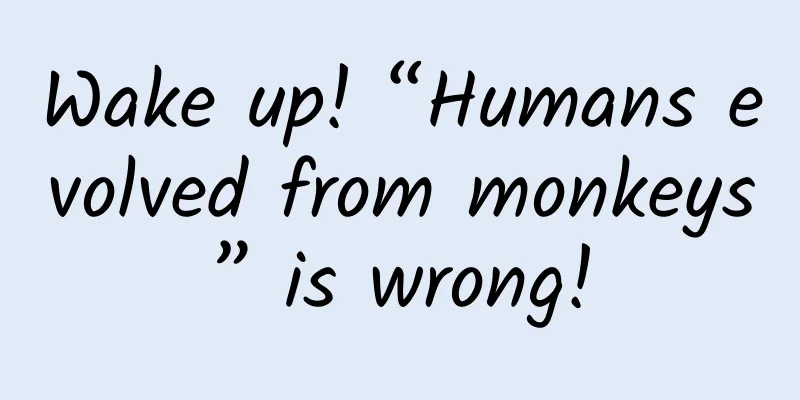Wake up! “Humans evolved from monkeys” is wrong!

|
On April 19, 1882, Charles Darwin, a British naturalist, geologist and biologist, passed away. Whether you know Darwin himself or not, you must have heard of his theory of "survival of the fittest". This theory, together with his "common ancestor" theory, can be said to have laid an important foundation for today's biological evolution. When it comes to where humans came from in the theory of evolution, many people will definitely blurt out "From monkeys!" or "From gorillas!", and the following picture will appear in their minds: Copyright image, no permission to reprint Indeed, many people use this picture to describe "human evolution", saying that humans evolved from monkeys or gorillas. But in fact, this is a very wrong statement. Humans did not evolve from monkeys or gorillas ! In addition, there are actually many misunderstandings about evolution. Let’s talk about them today. 01 Did humans evolve from monkeys? Then why are there monkeys? Humans did not evolve from the monkeys we can still see today. The correct statement is that humans and today's monkeys have a common ancestor , which means that they are like brothers and sisters, and brothers and sisters can of course coexist. In fact, humans and all living things today have a common ancestor , but some creatures are so far away from us that we may have to go back billions of years to find the common ancestor, while monkeys are very close to us. Specifically, the closest living species to humans is the chimpanzee. Current research suggests that the process of separation between humans and chimpanzees lasted a long time, possibly starting as early as 13 million years ago, but they were still connected until 4 million years ago . The species 13 million years ago did not have an official name. Some people suggested calling it "proto-chimpanzee", but more often it was just given a code name CHLCA (the first letters of the English abbreviation for "the last common ancestor of humans and chimpanzees"). As the name suggests, it is the ancestor of both humans and chimpanzees. Of course, it looks more like a chimpanzee, but it is not the same as today's chimpanzee. Copyright image, no permission to reprint So what is the relationship between this and monkeys? Traditional taxonomy believes that orangutans (including apes) and monkeys are two different species. Monkeys have tails, but orangutans do not . However, modern taxonomy has found that having a tail is only a superficial difference. If we look at the genetic essence, it is more reasonable to classify orangutans under monkeys. According to the latest view, humans are a type of orangutans, and orangutans are a type of monkeys . 02 Darwin was overthrown? Of course, there are many errors in Darwin's book, some of which were corrected in later versions, and some of which were correct but were changed to errors. He did not understand genetics and had not read Mendel's research, which brought great difficulties to his theoretical system. However, there are two basic principles in his theory, which are still the basis of evolutionary theory . The first is natural selection —the most important mechanism of evolution is that environmental conditions make individuals with certain genetic traits more likely to survive. The second is common ancestry - all existing organisms come from the same ancestor and differentiate into different species as the environment changes. You wouldn't guess that whales are more closely related to hippos than to other fish because they share a recent common ancestor. In this sense, the core of Darwin is not flawed and cannot be said to have been overturned . Today, people sometimes still call the theory of evolution Darwin's theory of evolution or Darwinism, which is unnecessary but also not inappropriate. Today, the theory of evolution is still a very active academic field, with many controversies, but there is no sign that these two foundations have been overturned. Moreover, these controversies rarely target Darwin himself. We already know where he got it wrong. Where he got it right, it is still basically right. 03 evolution? The law of the jungle where the strong prey on the weak? The result of the evolutionary mechanism is that individuals survive, reproduce, and pass on their genes. Eating is of course inevitable, but eating is far from the only thing to do. Therefore, the way animals interact in nature is far from the law of the jungle . For example, within the same species, they can cooperate with each other like elephants, fight in a ritualized manner like male reindeer, sing to mate like willow warblers, play games like side-spotted iguanas, and of course they can be as violent as mallard ducks. Copyright image, no permission to reprint Different species can co-exist and cooperate like hermit crabs and sea anemones, they can betray each other when the opportunity to cooperate comes like cleaner fish, they can compete for common resources like cattle and sheep, and of course they can also be the prey of the strong. Even plants and fungi that seem passive have all kinds of mutual benefits and intrigues. The ways in which individuals in nature interact with each other are not necessarily less than those of humans. To put it another way, even if the natural world is really a jungle of the weak, this has nothing to do with how we as humans deal with the world. Humans do so many things that are different from other animals, and there is no reason to learn from other animals in this regard. 04 Are humans the pinnacle of evolution? The popular saying that "man is the most intelligent creature in the world" seems less credible considering that this saying is invented by man. Of course, man is probably the smartest of all living species, but there is no reason to say that evolution only favors intelligence and disregards factors such as size, athletic ability or fertility. Humans are not even the latest species to be born, and new species are still being born at this moment. Humans themselves are still in the process of evolution, and the frequency of genes changes with each generation. After tens of thousands of years, we may be able to observe obvious changes in appearance or anatomical structure. Copyright image, no permission to reprint You can imagine the history of evolution as a tree with a truncated top. All species that exist in the world today correspond to branches that are flush with the top of the tree. As time goes by, each branch grows upwards synchronously. When some species become extinct, their branches freeze at that height and no longer grow. When new species are born, their branches split in two at that point. In this sense, as long as you are alive, you are at the peak . As far as we know, evolutionary history has no obvious direction on a large scale of billions of years. There may be slight overall tendencies, such as small individuals may be slightly more likely to survive than large individuals, but these slight tendencies will be overwhelmed by countless other specific factors in a specific ecological environment. In any case, humans or human-like creatures are not the purpose or end of evolution, nor are they something that is bound to be born in evolution . 05 Is evolution just a theory? In everyday language, the word theory is often opposed to reality, and even implies that it is divorced from reality, is just empty talk, or is a castle in the air. However, in scientific terminology, the word theory has a clear and specific meaning. Only those that have formed a system and have been fully verified by facts can be called theories, so this is actually a very high-level word, and it is remarkable to be called a theory. Among the numerous scientific theories, the theory of evolution also holds a very high status . In fact, looking at the entire biological field, it is difficult to find any theory with more evidence and greater influence than it. If it is so high-profile, why is it still controversial? The higher the status of a theory, the more attractive it is, and later researchers want to solve its legacy. 06 Is there no evidence for evolution? Most of the discussions about evolution on the Internet are about the history of evolution, which happened in the past and cannot be witnessed by humans. So there is a saying that the theory of evolution is just speculation and there is no real evidence. There are two problems with this argument. The first problem is that it is unfair to the methodology of historical studies. There are many things in the world that cannot be seen with one’s own eyes, but we still have ways to study them. Although historical events occurred in the past, their impact continues to this day. The bones of organisms will become fossils, environmental chemistry will leave isotopic evidence, and mutations will continue to be inherited to this day . Copyright image, no permission to reprint The second question is that the theory of evolution is not just about evolutionary history. Evolution is always going on , and it is not always slow. Many evolutions can be observed within a few years. Modern molecular technology can even monitor real-time evolution within a few days, and experimental methods can be used to study it. These results and evolutionary history support each other and together constitute evidence. Paleontologists have also been working hard to find various fossil evidences and try to fill the gaps in evolution. Author: Fan Gang, PhD student in biology, science writer Reviewer: Tao Ning, Associate Researcher, Institute of Biophysics, Chinese Academy of Sciences The cover image and the images in this article are from the copyright library Reproduction of image content is not authorized |
<<: Why do doctors recommend potassium supplements for people with high blood pressure?
>>: Since when did "drink more hot water" become a panacea?
Recommend
Is the investment cost of Baotou Tourism Supplies Mini Program high? Baotou Tourism Products Mini Program Investment Fees List
How much does it cost to attract investment for t...
This kind of food that you think is very "dirty" is actually rich in nutrients
Duck blood is a very common food ingredient, smoo...
Swollen lymph nodes, it's better to have pain than no pain! You can check yourself by touching these parts
Expert of this article: Wang Qian, attending phys...
Hot! Decrypt the most complete APP operation and promotion strategy in history, a must-have manual for experts to grow
In 2015, mobile Internet startup products face mo...
Bamboo flowering means bad feng shui? Stop believing in superstition!
It, facing the pond, is like jade, and would rath...
Image social networking is counterattacking general social networking
Preface: If we look back at the original intentio...
The past and present of "Sanfutie"
Author: Yang Yingzhan, Institute of Chinese Mater...
Don’t miss this kind of Moments! WeChat Tiger Year Red Packet Cover is here
The Spring Festival is getting closer and closer,...
NetQin was repeatedly attacked by Muddy Waters because of the help of "insiders"
Recently, the US short-selling agency Muddy Water...
If you are given 10 million for promotion, how can you effectively distribute the channels?
To be honest, in today's fierce market enviro...
From storm surges to seawater intrusion: What challenges does global warming bring to coastal cities?
Tuchong Creative On October 21, seawater backflow...
The Moon is "Rusting", and the Reason is the Earth?
On March 15, the National Space Administration an...
For mobile phone system updates, you must know these knowledge points
Whether it is an Android phone or an IOS phone, t...
Why can’t you play good standalone games? Tencent can’t take the blame alone
Domestic stand-alone games are a topic that can n...
Is it feasible to promote traffic on Douban? How to promote and attract traffic?
For those who are engaged in online promotion and...









